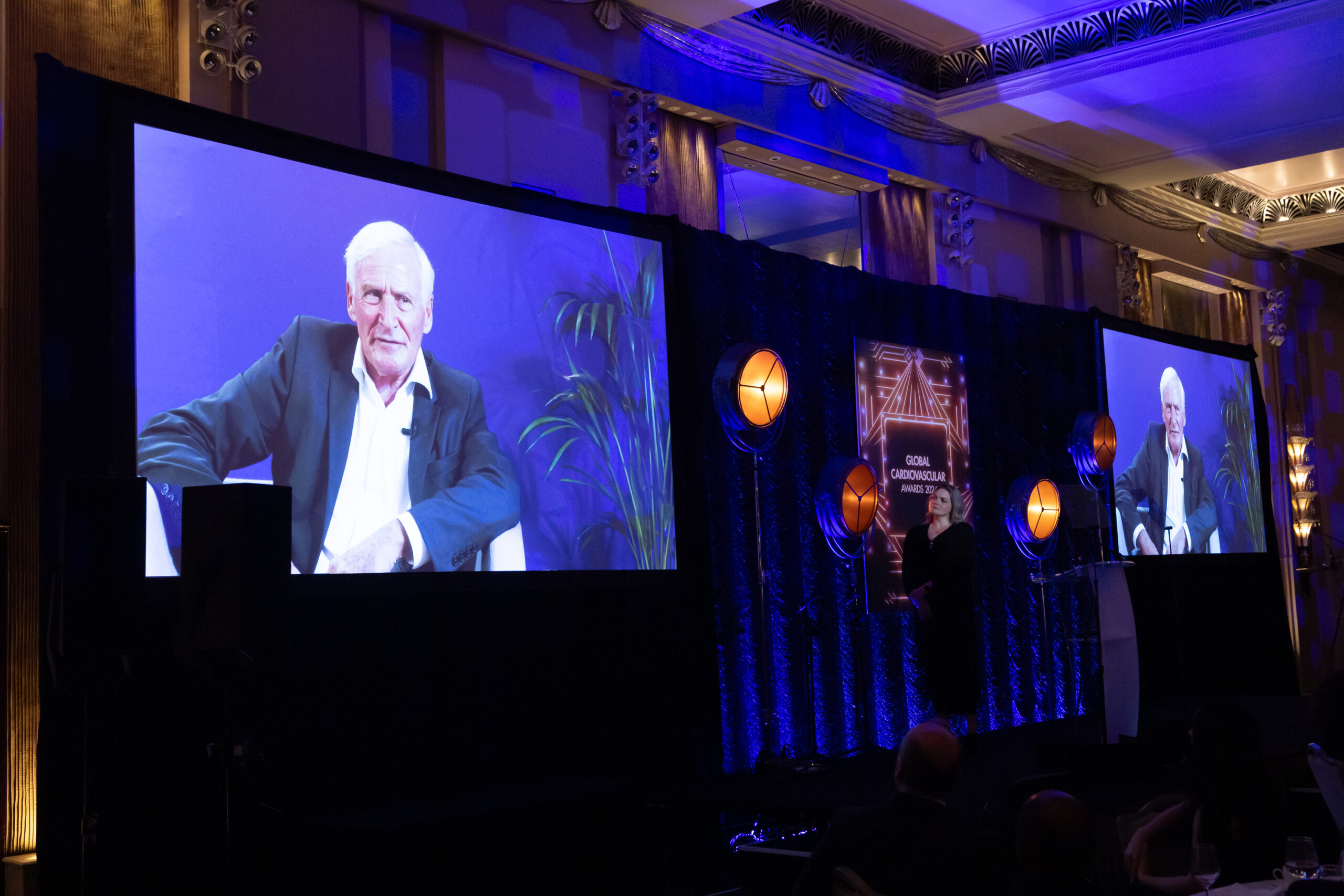
A founding father of transcatheter aortic valve implantation (TAVI), professor Alain Cribier (University of Rouen, Rouen, France), was posthumously recognised for his role in advancing the field of cardiovascular care at the first Global Cardiovascular Awards.
The awards, hosted by Cardiovascular News with support from industry partners Concept Medical, Endologix, Edwards Lifesciences and GE Healthcare, in partnership with the World Heart Federation (WHF), seeks to recognise the innovators and pioneers at the vanguard of efforts to improve the treatment of cardiovascular disease worldwide.
See the full list of winners and highly commended entries here.
Across 13 categories, awards were presented to some of the individuals, industry leaders and non-profit organisations who are helping to shape the future of cardiovascular care. Each award category was adjudicated by an expert judging panel assembled by Cardiovascular News, and the winners were announced at a lavish ceremony at London’s Grand Sheraton Hotel yesterday evening (14 March) hosted by the comedian and entertainer Naomi Cooper.
Cribier, the TAVI pioneer whose trailblazing work helped to usher in a new era in interventional cardiology, heralding the advent of the transcatheter treatment of valvular heart disease, sadly passed away in February at the age of 79.
Attendees of the Global Cardiovascular Awards heard moving tributes to Cribier from Michael Reardon (Houston Methodist Hospital, Houston, USA) and Lars Søndergaard the divisional vice president, medical affairs and chief medical officer, Structural Heart at Abbott.
“Alain Cribier will always be seen as one of the greats of cardiology, and one of the greats of cardiovascular medicine in general,” Reardon said of Cribier. “Not only was he a true innovator and a pioneer in multiple areas, but I think he will really be remembered for what a great person he was.”
“Alain Cribier has inspired many people,” added Søndergaard. “If you really believe you have something that can change the treatment of patients, be persistent and keep working. We can learn a lot from what Cribier did in his journey, and it should be an inspiration for young people in this field.”

Among the other winners on the night was Rasha Al-Lamee (Imperial College London and Imperial College Healthcare NHS Trust, London, UK), who received the Future Leader award for her impactful research on the treatment of angina with coronary stenting through the ORBITA and ORBITA-2 trials. Presenting her the award, Mirvat Alasnag (King Fahd Armed Forces Hospital, Jeddah, Saudi Arabia), a member of the Global Cardiovascular Awards judging panel, praised Al-Lamee’s practice changing work as having raised the bar for research in the field.
Another interventional cardiology pioneer, Bruno Scheller (University of Saarland, Saarland, Germany), who has led the way in research of the use of drug-coated balloons (DCBs), was recognised for his years of work in this area, picking up the Clinical Research Excellence Award. Scheller’s work on the topic began in the late 1990s, and he and his team continue to work on improving DCB catheters, developing special applications, as well as researching alternative drugs coatings.

“This is a great honour for me,” Scheller told Cardiovascular News, commenting that it supported his persistence with this approach. “We now see that, in the coronary arteries there is interest from more and more interventional cardiologists all over the world in using DCBs, not to replace stents but to limit the number and the lengths of stents to improve patient outcomes.”
Teri Sirset, the co-founder and CEO of Dasi Simulations, a company that is developing artificial intelligence (AI)-driven simulations to improve modelling for heart valve procedures picked up the CEO of the Year Award, with the judging panel recognising her leadership accomplishments, strong patient focus, and active engagement in the med-tech community as having made her a standout candidate for the award.
“I felt it was really important being a female CEO and a first time entrepreneur to share with other women that this is possible,” said Sirset of her motivation for entering the awards in its first year.
In the Best Cardiovascular Product Launch, Siemens Healthineers triumphed for its three-part launch campaign within the ARTIS family of angiography systems which took a digital storytelling approach with messaging tailored to different target groups.

Medtronic picked up the award for Best Medical Education Campaign for its Tour for Life initiative, aimed at bringing hands-on training to more than 3,000 cardiac surgeons in 12 countries throughout Europe and widening access to educational using a training truck that toured 38 locations throughout the campaign.
In the category celebrating the most impactful patient-facing awareness campaign—Best Public Awareness Campaign—Heart Valve Voice collected the prize for its work raising awareness in the over 55s of the red-flag symptoms of heart valve disease. Judges cited the precision of the campaign and its audience-targeted messaging and delivery, which was backed up by strong data highlighting its reach.
Innovation was a key theme running through the awards, and several categories sought to recognise the ingenuity and novel use of technology to improve outcomes for patients with cardiovascular disease.
The Essex Cardiothoracic Centre was the winner in the Digital Innovation Category for its use of FibriCheck, a smartphone-based monitoring tool for patients with arrhythmias used following ablation for atrial fibrillation. Use of the tool contributed to improved efficiency in the assessment of AF and was met with a positive response from patients.
GE Healthcare picked up the Innovation in Cardiac Imaging Award for its Vscan Air SL dual-headed, handheld, wireless ultrasound imaging system designed for rapid cardiac and vascular assessments at the point of care. Judges recognised the enormous potential of the technology for expanding access to care.
In the Innovation in Cardiac Surgery category Endologix collected the award for its Detour percutaneous transmural arterial bypass system a unique technology that allows the creation of a fully percutaneous femoropopliteal bypass that is routed through the femoral vein.
The Edwards Lifesciences Evoque transcatheter tricuspid valve replacement system triumphed in the Innovation in Interventional Cardiology category, with judges recognising that the encouraging preliminary data underpinning the use of the device, point towards a meaningful benefits to patients.

For its work to shield interventionalists from the harmful impact of radiation in the cath lab, Radiaction collected the Innovation in Patient and Operator Safety Award for its technology that proactively blocks radiation at the source.
In one of the biggest draws of the night, the team from James Cook Hospital in Middlesbrough (UK) were named as the heart team of the year, seeing off competition from the team from CHU de Bordeaux (Bordeaux, France) after a public vote.
Prior to the Awards ceremony, WHF president David Allan Wood introduced attendees to the organisation’s Colours to Save Hearts campaign, addressing rheumatic heart disease in the developing world.













